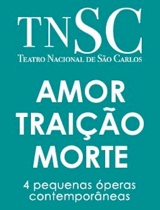|
|
>> Versão Portuguesa |
| Four Mini-Operas MANUEL PEDRO FERREIRA |
2012.03.06 |
|
To me, the first evidence was that the spectacle involved professionals of the first water: apart from the already mentioned, one should distinguish the commitment of the instrumentalists and the vocal performance (full technical command, richness of voice-quality, musical rigour, clear declamation) of the mezzo-soprano Maria Luísa de Freitas, the tenor Marco Alves dos Santos and the baritones, João Merino and Mário Redondo, as well as the soprano Sara Braga Simões, who was perhaps less exposed, but still with as solid a presence. The second evidence was that the quality of musical writing did not leave anything more to wish for. I was never assaulted with the vague sensation of being able to imagine or do something better, a reaction perhaps unreal and proudish, but which, when it interferes with the aesthetic experience, is generally a symptom of failure on the composer’s or performer’s part. On the contrary: I was totally convinced that, for example, in a piece of mine I would sustain with great difficulty the boisterous rhythm of “Manucure” (Edward L. A. d’Abreu) or achieve the musical and dramatic balance of “Fado olissiponense” (Luís Soldado/Rui Zink). These are extraordinarily mature works, in which one finds a total superimposition between the perceived intention and the achieved outcome – exemplary creations, in which the means are entirely adequate to the purposes. And still they could not be more different from each other. Before developing this subject I would like to make reference to the initial and final mini-operas. “Inês morre” by Sofia Sousa Rocha is based on a piece under the same title by Miguel Jesus, from which the author extracted the commissioned libretto. Incorporating dialogues and taking as a departure point an already deceased Inês de Castro, gives a reflexive and dream-like orientation. The fact that the reflection and dream are fulfilled in the culmination of Inês’ drama has a musical consequence, which creates, simultaneously, the force and the weakness of the work: it is a prolonged emotional climax with permanent evocative intensity. The vocal line always polarizes and magnetizes the texture, unfolding and stressing various harmonic colours, whereas the timpani mark obsessively the funereal horizon. In short, Inês dies excessively. Tiago Cabrita’s “A vida inteira”, has as its basis a libretto by António Carlos Cortez from a poem by Ruy Belo “Um dia não muito longe”. Did I say libretto? Perhaps it would be assuming too much. A libretto is another thing (somebody should explain the history and identity of this genre and show how it is constructed). From an intensely melancholic, yet insufficiently sectioned, poetic text about everyday death, a dramatic scene was created, which, naturally, lacks musical contrast. However the expressivity is powerful, congruent as well as sustained according to formal plan, and only a composer of rare talent can succeed, as Tiago Cabrita did, in preparing and constructing a breathtaking final against the very “libretto” put to music. Contrary to this case, Luís Soldado and Rui Zink form a team consolidated by various collaborations; I remember “Alfa” (2007), an operatic scene premiered at the São Luiz Theatre, in which the close understanding between the composer and the librettist, as well as the efficiency of the result in the inherently musical humour, were already evident. In the present mini-opera, “Fado olissiponense” (its relation with the recently premiered “Hotel Suite” by the same creators deserves a better explanation in the programme, as both pieces were inspired in the New York episode, which led to the detention of Strauss-Kahn), the dramaturgical rhythm is, if possible, even more refined, as the composer explores all the possibilities of contrast. He is without equal in what concerns tempo changes, with corresponding diversified colours and textures, and naturally, different expressive atmospheres: try comparing the duet Ulisses/Penelope – phone call from the wife – with the following aria of Ulisses. Luís Soldado’s music incorporates foreign elements with great ease, without ever becoming stylistically servile or harmonically predictable; on the contrary, he establishes his own game rules as he plays them with us. Finally the poem “Manucure” by Mário de Sá-Carneiro gave life, in the composition of Edward Luiz Ayres d’Abreu, to a “Delírio futurista em doze númeors” (“Futuristic Delirium in 12 Numbers”). And in fact one can find here everything: the siren, the noise, the acceleration, dispersion of modernity according to the futuristic textbook, an atmosphere achieved through recurring to informal notations of the 1960s, blended with others, of more traditional character. The piece has a relentless rhythm of superimposed images, voracious succession and auto-annihilation; energy consumed in a pure diction of itself; and a flying imagination as if pregnant of itself. It is a completely adequate and convincing homage to futurism from almost one century ago, and at the same time a pleasing affirmation of liberty in view of various composition textbooks prevailing nowadays, and the institutional limiting of types of expression. More than a spectacle about the present, this series of mini-operas showed that it is legitimate to hope some future for Portuguese musical and theatrical composition. |
|
 As a result of a competition promoted by the
As a result of a competition promoted by the